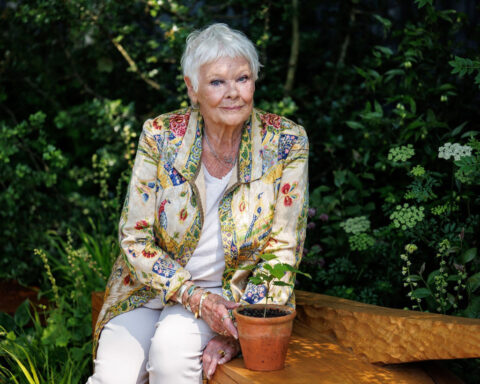(CNN) — Susan Wojcicki, the late CEO of YouTube, had a message for the world just weeks before she passed.
“Although lung cancer overall is decreasing because of declines in tobacco use, lung cancer among people who have never smoked has been rising significantly,” Wojcicki wrote in a YouTube blog that was posted Monday.
Wojcicki, a tech pioneer who was one of Google’s earliest employees, died in August after living with lung cancer for two years. She was 56.
In her YouTube blog, she calls for more resources investing in lung cancer research, especially in women and nonsmokers. The blog was written in the weeks before her death, according to YouTube, which posted it with the permission of her family.

“At the end of 2022, I was diagnosed with lung cancer. I had almost no symptoms and was running a few miles a day at the time. I had never smoked so I was totally shocked with this diagnosis,” Wojcicki wrote.
“Having cancer hasn’t been easy. As a person I have changed a lot, and probably the most important lesson I have learned is just to focus and enjoy the present,” she wrote. “Life is unpredictable for everyone, with many unknowns, but there is a lot of beauty in everyday life. My goals going forward are to enjoy the present as much as possible and fight for better understanding and cures for this disease.”
Wojcicki was not alone in her lung cancer journey.
A trend has emerged in the United States of more young and middle-age women being diagnosed with lung cancer at higher rates than men.
And although cigarette smoking is the No. 1 risk factor for lung cancer, many of these young women being diagnosed have never smoked. It’s estimated that about two-thirds of lung cancer cases in never-smokers are in women.
‘It was very shocking … totally unexpected’
Jhalene Mundin, a 36-year-old nurse based in New Jersey, has never smoked, and her doctor described her as otherwise healthy, with no risk factors. Yet last year, the mother of two received the shock of her life.
She was diagnosed with stage IV lung cancer, an advanced stage of disease in which it had spread outside her lungs.
Her eyes still fill with tears when she thinks about that day.
“I remember I was crying,” Mundin said of her diagnosis.
“I thought it was maybe stage II or III. But when she said it was stage IV, I felt like the room was closing in on me. And I remember saying ‘No, no,’ because I was thinking about my kids,” she said. “I was like, ‘No, I can’t die yet, because I have two kids that I need to raise. They still need me.’”
Before Mundin’s diagnosis, she had had a persistent cough that was getting worse – but she thought it may have been a lingering symptom from a case of Covid-19.
However, she had an appointment on her calendar to get an X-ray of her hip due to hip pain.
“My friend, who is also my co-worker, she was like, ‘You’re already getting an X-ray of your hip. Why don’t you get a chest X-ray?’” Mundin said.
“And so the doctor gave me a script for both,” she said. “Then the chest X-ray showed a big mass. The persistent cough was from the lung cancer.”
Most people with lung cancer don’t have symptoms until the disease is advanced, but some common symptoms of lung cancer may include a persistent cough that gets worse or doesn’t go away, chest pain, shortness of breath, wheezing, coughing up blood, fatigue or weight loss.
Lung cancer ‘clearly’ climbing in nonsmokers
Research suggests that lung cancer diagnoses have risen 84% among women in the US over the past 42 years while dropping 36% in men. Women who have never smoked are more than twice as likely as male never-smokers to get lung cancer.
“Lung cancer is clearly increasing in never-smokers,” said Dr. Helena Yu, a thoracic medical oncologist and early drug development specialist at Memorial Sloan Kettering Cancer Center.
“So 20% of lung cancers that are diagnosed this year and more recently are in never-smokers – and that equates to like 40,000 cases a year,” she said. “Then 1 out of 5 people who die of lung cancer now are never-smokers, too. So we’re seeing an increased diagnosis but also a death rate that’s keeping up with that.”
She added that the youngest lung cancer patient she has treated was diagnosed at 26. That person also did not have a history of smoking.
Although it remains unclear what exactly is driving this rise in lung cancer among young women, Yu has some ideas.
“I think that there are two ways or reasons that never-smokers get lung cancer. I think that there are exposure issues – which are like air pollution, asbestos, secondhand smoke, radon – and those are kind of rare and maybe make up a small portion,” she said. “And then there are mutations that cause lung cancer, and we are also seeing a really significant increase in these mutations that cause lung cancer, and those are enriched in women.”
Mundin said her doctor was “95% sure” that a genetic mutation was behind her lung cancer diagnosis. She grew angry that she had never been told about this mutation, even though she is a nurse.
“If I had known, I would have been on top of it,” she said. “I was mad that no one was talking about it. That – why wasn’t there a screening like colon cancer or breast cancer?”
A mutation in the gene that codes for the epidermal growth factor receptor, or EGFR, has been associated with an increased risk of lung cancer. It is just one of several genetic mutations that are tied to an increased risk of the disease.
The EGFR protein can help cells grow too much, which can cause cancer.
Like Mundin, 38-year-old Kara was diagnosed with EGFR lung cancer and said that, as a patient, she sees a considerable need for more research. Kara is one of Yu’s patients.
“My hope for the future is that there will be momentum around the EGFR and so that they can continue to research to find a cure, because it is impacting a lot of individuals that are healthy, and it’s just kind of sideswiping us,” Kara said.
Kara began noticing pain in her right arm and shoulder in February. Eventually, an MRI revealed a roughly 6-inch malignant tumor in her arm, she said, and she had reconstructive surgery because the tumor grew extremely large.
But doctors determined that the cancer did not originate in Kara’s arm, and they raced to find its origin. In June, Kara was diagnosed with stage IV lung cancer. She had no history of smoking and no risk factors and was otherwise healthy.
“It was very shocking to get this news and totally unexpected,” said Kara, who has requested that CNN not use her last name for privacy reasons.
With help from her care team at Memorial Sloan Kettering Cancer Center, she has been able to continue living an otherwise normal life while undergoing treatment, she says. She leans on her friends, boyfriend, family and faith.
“I’m living my life normally. I run marathons, and I’m still able to do that,” Kara said.
“I ran the Chicago Marathon in October,” she said. “I’m still traveling. I’m still spending time with my family. I feel great. I don’t feel sick, so I’m very blessed to feel good and have such great quality of life.”
Research suggests that EGFR mutations are more prevalent among tumors from women than from men, appearing in about 59% of tumors from women versus 26% of tumors from men.
Some studies also suggest that EGFR mutations occur at a significantly higher frequency in tumors among East Asians compared with non-Asian people, appearing in one study in about 30% of tumors from East Asians versus 8% of tumors from non-Asians.
“There are certain mutations like EGFR that are more common in Asian women,” Yu said.
Mundin said she “basically fit the bill,” as she is young and Asian and has never smoked.
She later connected with two friends in her social circle who also were diagnosed with lung cancer associated with a genetic mutation. They both also are Asian, she said.
An urgent call for more research
Dr. Alexander Drilon, who has been treating Mundin for lung cancer, said he treats many people whose cancers have targets, such as EGFR mutations.
“These patients tend to be, like Jhalene, younger at diagnosis compared to patients who get smoking-related lung cancers, and many of them are women,” Drilon, a thoracic medical oncologist and early drug development specialist at Memorial Sloan Kettering Cancer Center, wrote in an email.
“In the earliest stages of our learning about the EGFR target, young women who never smoked was a demographic that was strongly associated with EGFR+ lung cancer,” Drilon said, adding that there are also many lung cancers that have other targets that are diagnosed in young women who never smoked.
“While I am not surprised that this trend has been observed in lung cancers with targets, it still remains a mystery as to why these cancers develop in young women,” he said. “Scientists in the field have hypothesized the potential contribution of environmental factors or genetics, but this far, no one has made an extremely strong connection with one particular factor.”
Lung cancer can be treated with surgery, chemotherapy or radiation therapy, but Drilon said that many of the cancers associated with genetic mutations can also be treated with targeted therapies, drugs that target genetic mutations found in a tumor to block the growth and spread of cancer cells.
“Because of these new therapies, patients that receive them may survive for much longer than those that do not,” Drilon said.
This ongoing mystery around the biological differences in lung cancer has led some lawmakers to call for more research into these differences.
Last year, US representatives introduced the Women and Lung Cancer Research and Preventative Services Act, which aims to commission more lung cancer research and would require the US Department of Health and Human Services to conduct an interagency review of the status of lung cancer in women, including identifying new opportunities for screening, diagnosis and treatment.
Historically, women were not represented in some large lung cancer studies, and before 1993, many clinical trials omitted women.
Lung cancer is the leading cause of cancer death in the US, but it appears to be among the least-funded of the major cancers in terms of research dollars, suggesting that lung cancer research is underfunded relative to its burden on society. In 2019, only 15% of the National Institutes of Health’s $267 million lung cancer budget went to women-focused research, according to the nonprofit Women’s Health Access Matters. Yet lung cancer kills more women in the US than breast, ovarian and cervical cancer combined.
‘A lot of us were diagnosed … very late’
Lung cancer is so deadly in part because it’s often diagnosed late, when it’s harder to treat.
Mundin said that she hopes more awareness is raised around this increase in lung cancer among young women and that it leads to the development of targeted screening, such as for people with a genetic mutation.
She hopes there is greater understanding around how to diagnose some of these lung cancer cases early – especially for her two young children, and their future.
The only recommended screening test for lung cancer in the US is a low-dose computed tomography or CT scan. In this scan, a patient lies on a table while an X-ray machine uses a low dose of radiation to capture images of their lungs.
Current guidelines from the American Cancer Society recommend annual lung cancer screening for current or past smokers starting at age 50. The US Preventive Services Task Force, a group of independent medical experts whose recommendations help guide doctors’ decisions and influence insurance plans, has similar recommendations.
“But we have a lot of patients who never smoked,” Mundin said. “A lot of us were diagnosed at stage IV, which is already late, very late.”
However, there have been efforts internationally to identify never-smokers who may benefit from screening, Yu said.
One of these studies, the TALENT study, conducted in Taiwan, enrolled about 12,000 people who didn’t have a history of smoking and gave each low-dose CT scans.
“They found lung cancers in about 2.5%,” said Yu, who was not involved in the research. The study also found that the prevalence of invasive lung cancer was higher among participants with a family history of the disease than in those without.
When looking at the global landscape of medicine, “this is not a forgotten area, and we are trying to figure out if we can select out high-risk people and try to screen them for lung cancer,” Yu said. “Because early detection for all cancers is really correlated with survival.”
The-CNN-Wire
™ & © 2024 Cable News Network, Inc., a Warner Bros. Discovery Company. All rights reserved.

 Estimated 24.6 million TV viewers watched inauguration coverage, smallest audience since 2013
Estimated 24.6 million TV viewers watched inauguration coverage, smallest audience since 2013
 Mother on trial in West Virginia denies locking adopted teens in shed
Mother on trial in West Virginia denies locking adopted teens in shed
 Extreme cold and snow across the South isn't a threat to most native plants and animals, experts say
Extreme cold and snow across the South isn't a threat to most native plants and animals, experts say
 Star-filled Louis Vuitton show unveils East-meets-West streetwear in collaboration with Kenzo
Star-filled Louis Vuitton show unveils East-meets-West streetwear in collaboration with Kenzo
 Trump order leaves Cuba prisoner deal in limbo
Trump order leaves Cuba prisoner deal in limbo
 Ichiro Suzuki headlines 2025 Baseball Hall of Fame class, receiving 99.7% of the vote
Ichiro Suzuki headlines 2025 Baseball Hall of Fame class, receiving 99.7% of the vote
 The facts about Trump's Stargate AI announcement
The facts about Trump's Stargate AI announcement
 Trump says he is open to Musk buying TikTok if Tesla CEO wants to do so
Trump says he is open to Musk buying TikTok if Tesla CEO wants to do so
 Chicago Bears hire offensive guru Ben Johnson as head coach
Chicago Bears hire offensive guru Ben Johnson as head coach
 Manuel Orbegozo/Reuters via CNN Newsource
Manuel Orbegozo/Reuters via CNN Newsource







